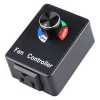raggyb
Well-Known Member
Would you disagree or agree? What are advantages of DC? I want to consider a DC powered fan instead of AC. This is pertaining to a 6" round duct with odor control filter attached.
Summarizing the link https://www.pelonistechnologies.com/blog/advantages-and-disadvantages-of-ac-fans-and-dc-fans , summary in purple, but what do you think?
Summarizing the link https://www.pelonistechnologies.com/blog/advantages-and-disadvantages-of-ac-fans-and-dc-fans , summary in purple, but what do you think?
- In the past, big AC fans were typically less expensive compared to big DC fans. Today however, their price difference is negligible due to their payback advantage.
- Consumes less power DC fans are widely regarded as the most efficient type of fans. They consume significantly less power than AC fans. In fact, DC fans consume up to 70 percent less energy to produce the same output as traditional AC fan types.
- PRO: Minimal electromagnetic interference (Why computers use them)
- PRO: Acoustically Quieter, DC fans make use of a new type (sin180) of electronically commutated motor (ECM). Not only are these motors ultra-efficient, they are also incredibly quiet. (I don't know about this because I saw one on you tube was a noisy little bitch)
- PRO: Variable flow, With minimal additional cost, the DC fan can offer a variety of speed control functions, so that the fan can meet the airflow target of a given application. The fan can be controlled by:
- Voltage
- Current
- Temperature
- Resistance
- PWM signals (is this hard to do?)
By controlling the fan speed according to what is needed, the life of the fan can be increased and its acoustical airflow noise can be kept to the minimum necessary.
- CON: May require an AC to DC converter, The AC fans are powered by an alternating voltage source. The DC fans are powered by a constant voltage source. This means that, the DC fan must have an AC to DC converter, either externally or included internally in the DC fan to convert AC to DC Voltage to power the DC fan.

